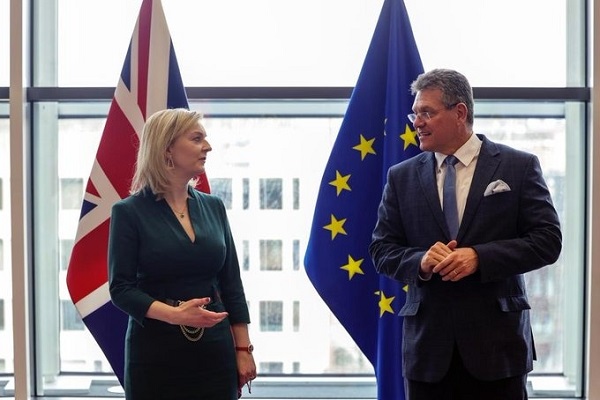
London, (Asian independent) The United Kingdom (UK) has announced its plan to introduce legislation in the coming weeks to make changes to the Northern Ireland Protocol amid mounting tensions with the European Union (EU) over post-Brexit arrangements.
“Our preference remains a negotiated solution with the EU,” UK Foreign Secretary Liz Truss told the House of Commons on Tuesday.
“In parallel with the legislation being introduced, we remain open to further talks if we can achieve the same outcome through negotiated settlement.”
With further details to be released in the coming weeks, Truss said the bill will ensure that goods moving and staying in the UK are “freed of unnecessary bureaucracy” and also that goods destined for the EU undergo full checks and controls as required by EU law.
A UK-EU rift has recently deepened over the protocol, under which Northern Ireland is part of the UK’s customs territory but is subject to the EU’s customs code, value-added tax rules and single market rules for goods, Xinhua news agency reported.
Despite the two sides’ agreement in October 2019, the protocol has caused divisions over how some of the rules should be implemented, particularly for goods moving from Great Britain to Northern Ireland.
While British leaders have argued the protocol needs to be amended, the EU has said a renegotiation is off the table.
To lay out the next steps, UK Foreign Secretary told Parliament that the priority is to uphold the Belfast Good Friday Agreement “in all its dimensions”.
Signed in April 1998 following three decades of conflict, the landmark Belfast Agreement established a power-sharing system of government, including an Executive and Assembly. It underpins Northern Ireland’s peace, its constitutional settlement and its institutions.
However, the agreement “is under strain,” Truss said, noting that the Northern Ireland Executive has not been fully functioning since early February because the protocol “does not have the support necessary in one part of the community in Northern Ireland”.
While the protocol has not yet been implemented in full due to the operation of grace periods and easements, she added, EU customs procedures for moving goods within the UK have already meant companies are facing significant costs and paperwork, among other practical problems.
Recently, the need to solve the dispute over the protocol has been made even more urgent after Sinn Fein, the Irish Nationalist Party, was in early May declared winner in elections for the devolved Assembly in Northern Ireland.
Coming second in the elections, the pro-Brexit Democratic Unionist Party has said it would not sit in the Assembly, citing its opposition to the protocol, which creates a trade border in the Irish Sea.
The UK Foreign Secretary said the UK has proposed a “comprehensive and reasonable solution” to deliver on the objectives of the protocol, including a trusted trader scheme to provide the EU with real-time commercial data, giving the bloc confidence that goods intended for Northern Ireland are not entering the EU single market.
“The challenge is that this solution requires a change in the protocol itself, as its current drafting prevents it from being implemented, but the EU’s mandate does not allow the protocol to be changed,” she added.
In response, European Commission Vice President Maros Sefcovic said on Tuesday that the UK’s plan to table legislation “raises significant concerns”.
He noted in a statement that the protocol is an international agreement signed by the EU and the UK and that unilateral actions contradicting an international agreement are “not acceptable”.
Should the UK decide to move ahead with a bill disapplying constitutive elements of the protocol as announced by London, Sefcovic added “the EU will need to respond with all measures at its disposal”.
Irish Foreign Minister Simon Coveney said on Tuesday that the UK’s unilateral action in respect of an internationally binding agreement “is damaging to trust and will serve only to make it more challenging to find solutions to the genuine concerns that people in Northern Ireland have about how the protocol is being implemented”.
Amid the rows over the trade deal, businesses are keeping a close watch.
“Firms are already reeling from the rising cost of doing business. The last thing they want is further uncertainty in trading arrangements amid global supply chain challenges,” said Angela McGowan, Regional Head for the Confederation of British Industry in Northern Ireland, on Tuesday.
“Now, more than ever, flexibility and compromise are needed from both sides to reach lasting trade solutions, securing peace and prosperity,” McGowan added.







